展览Exhibition / 感受金钱:当代艺术展
策展人Curator / 唐昕、高岭
艺术家Artist / 刘鼎,李颂华,彭东会,渠岩,宋冬,王迈,王强,夏建国,杨卫,朱发东,郑国谷
城市City / 北京
开幕Opening / 2001年12月22日下午3点
时间Duration / 2001-12-22 至 2001-12-23
地点Venue / 泰康顶层空间
展览现场
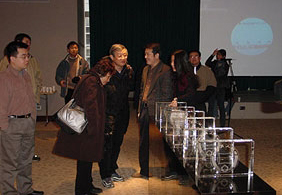
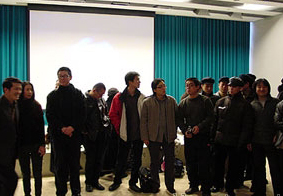

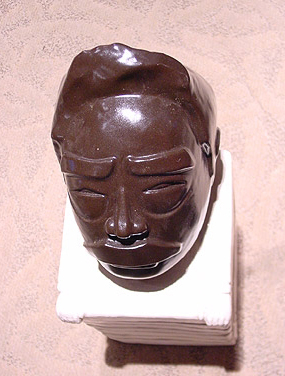
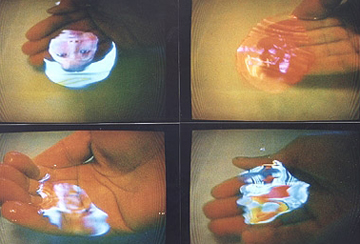
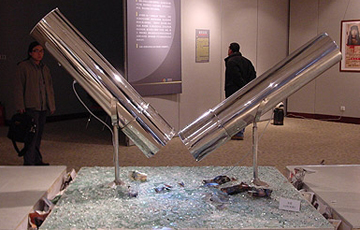
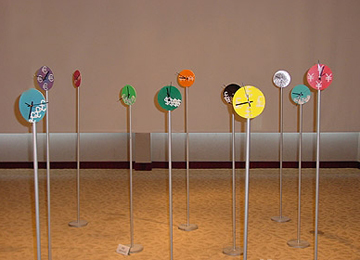
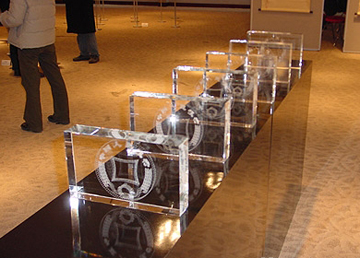
消费时代感受金钱
文/唐昕
改革开放以来的经济建设,繁荣了社会,改变了生活。今天,我们的政治、经济、生活、文化无不在适应市场机制的规律中运行,市场话语系统成为新的影响力。人们最直观地认为是“钱”在起作用,钱是日常生活中每个人随时随地都会触及的,和人密切相关。有人说钱是万能的,有人说钱是罪恶的;钱是成功的标志,是财富的象征……当钱转化为资本时,带来经济的发展、消费的繁荣、生活水平的日益提高。在亲身经历改革带来的巨变,在感受时代脉搏、享受幸福生活之时,我们以“感受金钱--Money, Funny, Honey”为题目做这个展览展示艺术对现实的观察与思考。
改革的20年中国逐步走向市场经济,全国人民都努力用“全新的理念与操作经验”武装自己向成功迈进。社会地位、个人成功、声望成为人们追求的目标和个人价值的体现。但在人们对他人的赞许与评价中,没有“治学严谨的学者”,没有“硕果累累的科学家”,没有“受人尊重的教授先生”,有的只是“成功人士”。它含概所有有钱有车出入豪宅的人们,无所谓知识结构、文化素质、出身、职业、致富途径的不同。这是由于历史原因,人们在文化素质上形成很大差异,彼此间缺乏文化上的认同感,没有共同的价值观、生活方式或行为准则,惟有以消费特征求得成功感、认同和价值感。于是消费能力和消费内容越来越成为评价依据。消费也因此具有了它的符号象征性。钱的实际功能便由交换工具变成了消费工具,钱的多少直接体现为消费能力的大小,直接影响到消费内容。于是挣钱成为人们一切行为的目的,工作为了挣钱,挣钱为了消费——“消费就是理想”。购物成了最快乐的事。麦当劳、名牌服装、手机、电脑、汽车...... 成为人们追求的生活方式的象征,从中人们找到了自己的位置、地位和同类人群,感到满足,有了社会归属感。消费验证了我们的存在,钱成就了我们。感受金钱——感受消费。不知不觉中消费主义文化在我们中产生、蔓延,中国社会进入“大众消费”时代。钱更重要了。人们享受着购物带来的物质使用价值满足以外的快感的同时,消费主义文化价值观在日常生活中占据了支配地位,消费主义也确立了在日常生活领域里的意识形态影响力。它创造并建构了 “大众消费”时代新型的社会关系和生活方式。
人们享受着购物的快乐,与此同时更快乐的是生产者。他们赚到了更多的钱,感受着资本带给他们的幸福。在“大众消费”促进经济发展、提高人民生活水平的溢美之辞的掩映下,真正提高的是他们的资本利润率。为了保证他们的利益,满足他们的兴趣,他们不断制造新的需求,利用大众传媒通过广告的商业促销手段不断制造美好生活的虚幻景象,刺激消费欲望并为大众购买做好心理准备,制造社会动力。“正视我,潮流无法躲!” 在媒体的推动下人们卷入的是时尚、是品位,是一次次的兴奋和向往。“我们在卖概念”。商品带来的是他们促销的消费观念、生活方式与象征价值,是消费商品的符号象征意义创造的话语系统。随着市场的对外开放、外国资本的引进,越来越多的国际名牌进入我们眼帘。人们在消费的同时又一次下载了商品- 消费主义符号所负载的价值观和生活态度。愉快地、不知不觉地认同了别人的逻辑秩序,却忽视了这种逻辑秩序中根深蒂固的利益、种族、文化歧视与偏见,使文化侵略成为事实,为经济与政治和话语上的不平等提供了文化- 意识形态的合法性和支配权。
不应忽视的是消费在推动经济发展的同时对文化的破坏。在我们越来越有钱的时候,我们的传统文化、伦理观和道德观被消费文化和“新的”伦理观和道德观所取代。人们从乡村涌进城里,远离了固有的生活方式,却达不到向往的方式成为城里人,而变成城市里的边缘人。我们的城市失去了它以往的景观及文化特征,变成一个个同样版本的现代化克隆样式。我们的生活空间变成了制造需求满足欲望的生产基地,传统也随着拆下的瓦砾被弃之一旁。面对着纷纭斑斓的机会和五光十色的诱惑,年轻人为无所适从的眩晕而苦恼,又不得不奋不顾身抢搭这时代的列车——我们在努力地成长。作为有着先于集体知觉的敏感的艺术家,从90年代初以来就不断关注消费主义文化及其对社会的影响,对不断产生的社会现象以艺术关怀。
朱发东的《寻人启示》、《此人出售,价格面议》、《生活方式一百天》是这场变革为我们的青春打上的烙印。青年们被时代的洪流推入一个无所依靠的境地,陷入在两次购物快感享受之间的空虚与迷茫。整个民族包围在改革的激情中,意义变得越来越不重要,金钱却拥有了收买一切的至高的权力。我们看到的是青年们在混乱、解构的环境中重新寻找自己的身份认同感,并希望最终发现自己的愿望。王晋的作品《敲门砖》是将百元美金的图象画在一块块古老的城墙砖上。西方的价值标准、生活方式匍匐于“可口可乐”、“麦当劳”等时尚商品,在我们尚未觉醒时,在抢占中国市场的同时,进行着对千年古国的文化侵略。这一切都在促进发展中国家经济建设的名义下堂而皇之地进行。他们在扑向我们市场得到利益之时,也带来了霸权和种族、文化的歧视与偏见。1993年王广义以他八十年代知识分子的责任对此提出了批判。
霸权者们在消费的时代以消费什么、怎样消费构筑了全球化新的文化- 意识形态,使一些人在满足对物质的实际及占有需求时,也滋生了虚荣的欲望:要炫耀派头、财力,显示身份。洪浩的《MR.洪浩》就进入了这样的角色。朱发东则径直带着他的《保镖》来到了我们身边。
展览“感受金钱——Money, Funny, Honey”希望呈现出有着不同时代背景、不同生活经验的艺术家对这问题的各自看法,这里遴选了从85时期至今的几代艺术家的作品。对于经济的发展及其给我们社会生活带来的影响,多年来艺术家们对此有着一惯的关注而作品在语言形式、表达方式、媒材选择的变化则直接折射出它的光影,因为经济发展、科技进步为艺术家的创作提供了更多的材料和技术手段。这将在高岭的文章中有所说明。
展览中,渠岩是85时期的艺术家,在他的作品《感受时间》中,我们看不到自身和我们的内心情感,它们已变得微不足道。 唯一可见的是全世界在努力统一步调追赶一个机器节奏——时间就是金钱。
杨卫的水晶材料的装置作品《分量》以“中国人民很行”偷换了人民币图象中“中国人民银行”的字样。在“钱”的作用下社会已有的道德文化基础趋于瓦解,“钱”成了唯一的标准和话语权力,憧憬美好生活的人们在梦幻中拒绝了对自身的反思与批判。在钱的驱使下一切似乎都可以成为商品,彭东会的《鲁迅新形象设计》让我们看到了CI战略的不顾一切及其商业成果。
广告是一种有效的促销手段,推销商品的同时推销的是生活方式及支持这种生活方式的文化价值观念。它激起的是人们的欲望,欲望使行为成为可能,宋冬的作品《水中捞月(2)》是对这个过程及其后果的关注。刘鼎和蒋立衡的video作品《欢迎购买“同志”》却有意借用广告的方式为自己大做宣传,兜售起另一件作品来。
郑国谷生活在广东省——中国消费的前沿,多年来作品一直关注消费现象。他的新作《千禧聊神》告诉我们在新经济时代,网络成为新的大众传媒——新的文化- 意识形态工具,它不分时间、地点、种族、国家传播并制造着新的话语系统。
对商品的符号意义的消费过程构建了社会新的权力和利益格局,产生了新的游戏规则。王迈的装置作品《幻听双塔》用儿时的万花筒让我们看到新的格局为我们制造的一个个不断变换的、美好而虚幻的美景。也让我们想起了在9.11事件中被炸毁的纽约世贸大厦。
今年秋天人们的话题总是围绕着APEC、WTO、自由贸易;谈论着全球经济面临衰退时,中国唯有的一帜独秀;谈论着中国正迈步走向的幸福。其实中国已经迈进人类集体的资讯爆炸、行色匆匆的现代以至后现代状态。 经济的发展是二十世纪文明的喜之出、恶之源。 中国在刚刚步入市场经济之时,又要奋起直追在全球风起云涌的“新经济”。我们不想与时代背道而驰,我们关心金钱,感受金钱,是关心着我们的生活环境和我们付出的不可逆转的代价。我们不断地享受着物质带来的满足,也感到了内心的孤独:我们陷入了物的汪洋,心灵依赖外物;随着技术进步我们个人可以拥有极大的力量,甚至是破坏力,世界却因此变得脆弱而不稳定;乐观前景掩饰着中华文化被“主流文化”推向边缘的危机;生态环境因人类消费过度消耗了能量、资源而遭破坏......我们的价值标准该是什麽?我们该怎样生活?当我们没钱时,钱是生活的基本;当我们有钱时,钱则意味着责任。
对于钱,颇多的感受因它而起,对它的追求也让我们付出了许多。那麽钱到底为何物?钱有功吗?钱有错吗?为了听到不同方面的声音,我还邀请了经济学家武欣欣先生从货币价值体系的专业角度、社会学家于长江先生从他个人的角度和我们一起关注我们的生存环境,也谈钱。另外,由于展览的时空限制,除现场参展作品外,为避免以一斑覆全豹,本画册中将收录90年代初至今其他艺术家的相关作品。此次展览得到了泰康人寿保险股份有限公司董事长陈东升博士及其公司的大力支持,在此表示我们的谢意,感谢他们对中国艺术本土化进程的贡献,感谢他们给中国当代艺术创造良好的本土社会环境的努力。
2001/12/01
Sense of Money in the Consumer Age
Longing for belonging
Tang Xin
Since the start of the reform policy economic development has enriched society and changed our lives. Today, our politics, life and culture are all unavoidably orbiting under rules adapted against the market system. The language of the market became a new influence. People perceive that it is the effect of money. Money is directly related to daily life of everyone. Some say it is almighty, some say it is sinful, the symbol of success, the sign of wealth…When it shapes capital, it brings development of economy, flourish of consuming, improvement of living standard. In experiencing the great changes that the reforms have made, feeling the pulse of the times, enjoying the happiness of life, we present this exhibition "Money Funny Honey" to you, as to observe and ponder of reality by art.
In the twenty years of reform policy, China is developing towards market economy. The whole population is arming itself with brand new concepts and experiences of practice in pursuit of success. Social status, personal success and fame became the purposes of life, and symbols of individuals’ values. However, there is no Authoritative Scholars, no productive scientists, no honourable Mr. Professors in hails and applause towards anybody. All we get is a successor, an ambiguous address referring to all those who possess money, cars, and mansions, regardless of the possessor’s educational level, family background, profession, or how they enriched themselves in the past. For historical reasons, there is a tremendous cultural between different people. There is a lack of mutual recognition of culture, values, life style, and norm of behaviour. The only source of feeling of success, recognition, and value is consuming. Therefore ability and items of consumption are more and more a basis of evaluation. Hence consumption acquires its symbolism. The actual utility of money becomes a tool for consumption instead of a tool for exchange. The amount of money directly reflects consuming ability and affects what people choose to consume. Making money becomes the purpose of all behaviour. Work for money, money for consumption, consuming is the ideal, shopping become utmost fun. McDonald’s, fashion brands, mobile phones, PCs, automobiles…become symbols of a life style which people are dreaming of, in which people find their positions, status, peers, satisfaction and a feeling of belonging to a community. Consuming defines our existence. Money makes us. Let’s reflect on money, and reflect on consumption. Consumist culture is coming into and spreading unnoticed among us. China enters a time of mass consumption. Money is all the more essential. While people are enjoying more than material utility brought along with consumption, consumist culture’s values dominate our daily life. Consumism has also established enormous spiritual influence. It creates new social relations and life styles in times of mass consumption.
People enjoy shopping, producers enjoy it even more. They make more money and enjoy the happiness that capital brought to them. Under the illusion that mass consumption is improving economy and living standards, it is only their profit rate that is really improved. They utilize mass media and propaganda campaigns to create one illusion of happy life after another, stimulate consuming desires, prepare the mass to buy, and propel the society only to ensure their benefit and satisfy their interests. Stare into me, you can’t avoid the trend. The media pushes people into fashions, tastes, excitements, and longings. We sell concepts. Merchandise brings the consumption concepts, life styles, and symbolism, which they are selling together with the language system created by the symbolism of the merchandise. With the market opening up to the world and the introduction of international capital, more and more world famous brands come to our eyes. Again people are downloading values and life attitudes integrated in the merchandise-consumist symbolism. Luckily people (unknowingly) accepted the others’ logic rules and overlooked the deep-rooted interests, racial and cultural prejudices. They made cultural invasion a reality, validated politics and language unequally, and domination from a culture-ideology point of view.
We shall not ignore the damage that consumption does, though it also drives business development. We become rich, we update our traditional culture, ethics and morals with new ethics and morals. People push themselves into cities from the country, rejecting their own way of life, their traditions. However they cannot become city people as they hoped. Instead they remain outsiders at the borderlines. Our cities loose their original identity and cultural characteristics and become multiple clones, all of the same version. Our living space becomes a plant producing needs and meeting desires. Traditions are thrown away with the ruin. The colourful opportunities and temptations confuse the young, who have no other choice but to board the train of new times----we are growing diligently. The foremost sensitive artists have been studying this consumism since the early 1990s and its effect on the society, and expressing an artist’s concern for social phenomena.
Zhu Fadong’s work, <People Lost>, <Individual for Sale at Bargain>, <Life Style 100 days> portrays the times’ brand on our youth. The youth is brushed into a corner, trapped in the void between the enjoyments of two shopping trips. The whole nation shows deep passion for further reforms. But meaning is no longer important to anyone, whereas money now grasps the supreme power to buy everything. We see the young re-locating their recognition of identity in this mass of dissolving world and hoping that they will discover themselves in the end. Wang Jin’s <Door-Knocking> is a drawing of a One hundred dollar bill on ancient city wall bricks. The Western values and life styles slipped in covered by Coca-Cola and McDonald’s and other popular products. They are not only grabbing the Chinese market, but also invading a country culturally which has a civilization of thousands of years. And all this is done at daylight, is even praised as support for the developing country’s economy. These global players came into our market, pocketed the profit, and brought dictatorship, racial and cultural prejudices. In the beginning of the 90s, artist Wang Guangyi, being an intellectual in the 1980s, took the responsibility of criticizing this.
Dictators established a new global culture-ideology about what and how to consume. Vain desires only come up after some people’s practical needs for material possession are met. Then they want to show off their status and wealth. Hong Hao’s <Hello Sir>r, shows us such a person, whereas Zhu Fadong comes with his <Bodyguard>.
The exhibition "Perceptions of Money—Money, Funny, Honey", is reflecting the respective views of artists with different life experiences from different times. Here are the works from artists of different generations since the Eighth Five-Year Plan. For years artists are monitoring the effect of the economic development on our social life. It directly influenced their language, expressions and choice of media for the development of economy and science has provided the artists with more materials and methods. This is further explained in Gao Ling’s article.
Qu Yan is an artist who represents the 85 period. In his work titled <Feeling Time>, we can not see ourselves or our inner emotional world. In his work, they are no longer important. The only thing we can feel from it is a mechanical rhythm----Time is Money, which the whole world is trying their best to pursue in a synchronized pace.
In Yang Wei’s crystal installation <Weight>, the words "Zhong Guo Ren Min Yin Hang" (Means: Bank of China) printed on every RMB banknote are exchanged with "Zhong Guo Ren Min Heng Xing" (Means: Chinese are capable). This reflects that under the effect of money, the cultural and moral bases of society are gradually collapsing. Money is becoming the only standard and power of language. Those people who are dreaming of a wonderful life refuse to reflect or criticize themselves. Being propelled by the money, it seems that everything can become merchandise. Peng Donghui’s work <Design of Lu Xun’s New Image> reveals the result to us: desperation and its commercial product of the CI Strategy.
Advertising is an effective way of promotion. When promoting merchandise, a new life style and its supportive cultural value are promoted at the same time. It triggers people’s desires, while desires change behaviour patterns. Shong Dong’s work <Salvage Moon in the Water (2)> shows a lot of concern to this process and its consequences. While Liu Ding and Jiang Liheng’s video work <Welcome to Pursuit ‘Gays’ > intents to promote themselves and sell another of their works through advertisement.
Zheng Guogu lives in Guangdong Province---- the frontline of consumption. For years his works have been focussing on the phenomenon of consumption. His new work <Great Talker in the Millennium> shows us that internet--a new tool to promote culture and values, is becoming a new public medium in this new economic era. The internet is spreading and producing a new language system independent of time, place, race and country.
The consumption process of merchandise’s symbolism forms a new social power and benefit structure, and creates new rules of the game. Wang Mai’s installation <Listening Fantastically to the Twin Towers> is a kaleidoscope which we know from our childhood days. Many of these colourful pictures are changing constantly and produce beautiful but fantastic views created by the new structure. This work also reminds us of the World Trade Centre Twin Towers in New York, history after the 9.11 incident.
Throughout this autumn, people’s conversations always focussed on APEC, WTO, Free Trade. People are talking about the unique phenomenon of China getting stronger while the whole world’s economy is fading out. People are thrilled about expecting China moving towards happy times. But in fact China enters the breathless Modern Era or even Post Modern Era, in which human beings are flooded with the aftermath of an information explosion. Economic development was the spring of love and hate in this 20th century culture. At the time when China just introduces market economy, it has to try its best to catch up with the New Economy surging forward around the world. We do not want to run against the worldwide trend, instead we care for money, enjoy having money. It shows that we care about our life environment and all irreversible costs we have paid. We keep enjoying material satisfaction, meanwhile we also feel the loneliness deep inside. We are in the sea of materials, and our soul is dependent on material from outside. With the development of technology, a person will have great power, even great destroying power. Hence the world is becoming weak and unstable. Bright future overcasts the danger that Chinese culture is compelled to a margin by the Main Stream Culture. Our living environment is being destroyed because energy and resources are over consumed… What kind of value standards should we have? How to live? When we do not have money, it is the base of our life, while when we have money, it means obligation to us.
As to money, all sorts of feelings well up in my mind because of it. Also we have paid a lot in order to pursuit it. Then what does money eventually mean? Is money helpful or is money evil? To hear different opinions, I invite economist Wu Xinxin to share his ideas of a professional Monetary Value System. Sociologist Dr.Yu Changjiang will write about our living environment as well as money from his personal point of view. As the exhibition can not show all those interesting works, we included other artists’ works in this catalogue. They represent the time since the early 90s, so that there will be a complete collection. This exhibition was sponsored by Dr. Chen Dongsheng and his company, Taikang Life Insurance Co., Ltd. Here I would like to thank them for their devotion to the local art scene thank them for their effort to provide a better local social environment for modern Chinese art.
01,Dec,2001

